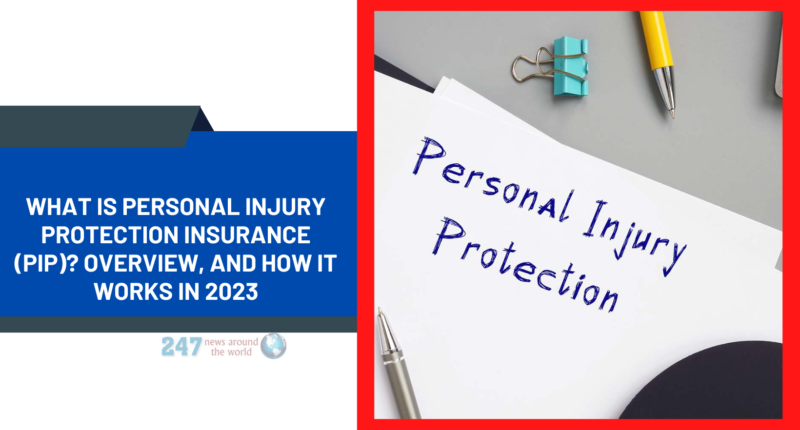Find out “What Is Personal Injury Protection Insurance (PIP)?” Personal Injury Protection Insurance (PIP) is a type of insurance that covers medical expenses and other related costs in the event of an accident. PIP insurance is mandatory in some states in the United States, and it can be added as an option to a car insurance policy in other states. In this article, we will provide an overview of PIP insurance, discuss how it works, and highlight some important considerations to keep in mind when purchasing PIP insurance.

What Is Personal Injury Protection Insurance (PIP)?
After you and your passengers are harmed in a car accident, personal injury protection (commonly known as “no-fault insurance”) pays for your medical bills and rehabilitative costs. PIP also covers you if you’re a passenger in someone else’s automobile or if you’re a pedestrian or cyclist who is hit by a car.
PIP insurance differs from bodily injury liability insurance in that, although PIP covers your personal expenditures, liability insurance covers the medical expenses of other drivers and passengers in other cars if you are at fault in an accident.
Some of the coverage provided by PIP insurance may be similar to that provided by your health insurance or Medical Payments policy. PIP insurance, on the other hand, is designed expressly for car-related injuries, which are occasionally excluded from health insurance policies, and it covers a number of additional expenses not covered by MedPay.
How Does PIP Insurance Work?
In the 1970s, legislation established the no-fault system to make it quicker and easier for accident victims to collect compensation, regardless of who was at fault. Financial losses such as medical expenditures are covered by each party’s own insurance carrier under this method, rather than waiting for insurers to agree on who was at fault—and legally liable—for accident costs.
After an accident, policyholders in states where PIP is mandatory or optional have the right to seek compensation from their own insurance provider. You can only sue the other motorist for additional medical expenditures or pain and suffering if your injuries meet a state-specific tort threshold in some of these states, known as no-fault states. Thresholds can be expressed in language words, such as death or major disfigurement, or in monetary terms, such as minimum medical bill amounts.
Let’s imagine you’re a Utah policyholder who is involved in a car accident. Your PIP maximum is $3,000, and your state has a $3,000 tort barrier. Because your accident-related medical expenses total $2,500, your insurance will cover the entire amount because it is less than your PIP limit (as long as you’re eligible—see the next section). You cannot sue the driver who hit you for pain and suffering since your medical bill is below the tort threshold.
Unlike no-fault systems, states with “add-on” car insurance legislation have no restrictions on lawsuits. However, like in no-fault states, drivers are compensated by their own insurers. PIP coverage is still compulsory in some of these states, while it is optional in others.
Coverage provided by PIP insurance
PIP insurance provides coverage for medical expenses and other related costs in the event of an accident. This includes coverage for medical bills, lost wages, and other related costs. PIP insurance may also provide coverage for other expenses, such as childcare expenses or household help.
Limitations and exclusions of PIP insurance
While PIP insurance provides coverage for a wide range of expenses, it does have some limitations and exclusions. For example, PIP insurance may have coverage limits, deductibles, and exclusions for certain types of injuries or accidents. It is important to carefully review the terms of a PIP insurance policy to understand its limitations and exclusions.
Coordination of benefits with other insurance policies
If a person has multiple insurance policies that provide coverage for medical expenses, such as health insurance and PIP insurance, there may be coordination of benefits rules that determine which policy pays for which expenses. It is important to understand the coordination of benefits rules for each policy to avoid confusion and ensure that all expenses are covered.
PIP insurance requirements by state
PIP insurance is mandatory in some states in the United States, including Florida, Hawaii, Kansas, Kentucky, Massachusetts, Michigan, Minnesota, New Jersey, New York, North Dakota, Oregon, Pennsylvania, and Utah. In other states, PIP insurance is not mandatory but can be added as an option to a car insurance policy.
PIP insurance vs. other types of insurance
PIP insurance vs. medical payments coverage
Medical payments coverage is another type of insurance that provides coverage for medical expenses in the event of an accident. However, medical payments coverage is typically limited to medical expenses only, while PIP insurance provides coverage for a wider range of expenses, including lost wages and other related costs.
PIP insurance vs. bodily injury liability insurance
Bodily injury liability insurance is a type of insurance that provides coverage for injuries caused by a person to another person in an accident. PIP insurance, on the other hand, provides coverage for medical expenses and other related costs for the policyholder and their passengers, regardless of who caused the accident. PIP insurance and bodily injury liability insurance can be complementary, and it is important to consider both types of insurance when purchasing car insurance.
Factors to consider when purchasing PIP insurance
Coverage limits and deductibles
When purchasing PIP insurance, it is important to consider the coverage limits and deductibles. The coverage limits determine the maximum amount of coverage that the policy will provide, while the deductible is the amount that the policyholder must pay out of pocket before the insurance coverage kicks in. Higher coverage limits and lower deductibles may result in higher premiums, so it is important to balance the cost of the policy with the desired level of coverage.
Premiums and discounts
The cost of PIP insurance premiums can vary depending on a number of factors, including the policyholder’s age, driving record, and location. It is important to shop around for insurance policies and compare prices to find the best deal. Additionally, some insurance providers may offer discounts for things like safe driving or bundling multiple insurance policies.
Provider network and access to care
When purchasing PIP insurance, it is important to consider the provider network and access to care. Some insurance providers may have a larger network of healthcare providers, which can make it easier to find a provider and receive care. It is also important to consider any restrictions or requirements that the insurance provider may have for receiving care, such as pre-authorization for certain types of medical procedures.
Conclusion
Personal Injury Protection Insurance (PIP) is a type of insurance that provides coverage for medical expenses and other related costs in the event of an accident. PIP insurance is mandatory in some states in the United States and can be added as an option to a car insurance policy in other states. When purchasing PIP insurance, it is important to carefully consider the coverage limits, deductibles, premiums, provider network, and access to care to ensure that the policy meets the policyholder’s needs.
FAQs
A: While health insurance may cover some medical expenses in the event of an accident, PIP insurance can provide additional coverage for things like lost wages and other related costs.
A: PIP insurance is mandatory in some states in the United States, and it can be added as an option to a car insurance policy in other states.
A: To find the best PIP insurance policy for your needs, it is important to shop around and compare policies from different insurance providers. Additionally, consider factors like coverage limits, deductibles, premiums, provider network, and access to care.
A: In most cases, PIP insurance is only available as an add-on to a car insurance policy.
A: PIP insurance provides coverage for medical expenses and other related costs for the policyholder and their passengers, while bodily injury liability insurance provides coverage for injuries caused by a person to another person in an accident.
Continue to check our website for more articles of this kind. And, please use our comment section as well, we would love to hear from you.






